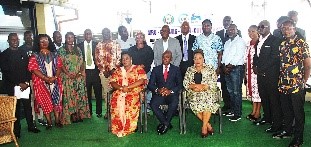Stakeholders of the Mano River Union (MRU), who convened for a two-day national validation workshop, have adopted a joint communiqué focused on rectifying the Protocols on the Protection and Use of Transboundary Watercourses and International Lakes.
Key outcomes from the workshop include the correction of the ESP acronym, the creation of a Technical Unit within the proposed management office, and the establishment of dedicated sections for Gender and Climate Change.
The rectification process also included provisions for conducting 360-degree evaluations of staff. Additionally, stakeholders recommended a 10-year duration for the ESP, with evaluation cycles set at intervals of 3 to 5 years.
Regarding the Operationalization and Deployment Plan, the Liberian delegation unanimously agreed to bypass its validation.
Delegates emphasized that the plan serves primarily as an internal working document, and therefore does not require formal rectification or signing by the MRU Ministerial Council.
The workshop, held from Thursday to Friday, aimed to advance the establishment of a Transboundary Water Basins Management Office a regional body envisioned to strengthen governance and promote sustainable management of shared water resources across the sub-region.
Over the two-day session, participants engaged in the review and validation of preliminary drafts of the protocol, organic texts, administrative and financial procedures manual, and the operationalization plan for the proposed office.
In her address, Ambassador Josephine Nkrumah ECOWAS Resident Representative to Liberia, identified illegal mining and artificial fishing as major threats to the water bodies of the Mano River Basin and the broader West African sub-region. She noted that the current deliberations are a critical step in implementing the 2008 ECOWAS resolution that promotes the creation of three new transboundary basin organizations in West Africa.
Ama Gborie Foday, MRU Deputy Secretary-General for Economic Development and Regional Integration, described the meeting as a milestone in the region’s collective effort to establish a cooperative and sustainable water governance framework.
She added that the initiative aligns with the Ouagadougou Declaration on Integrated Water Resources Management (IWRM), the ECOWAS Regional Action Plan for IWRM, and the MRU’s strategic vision for cross-border environmental governance, regional integration, and resilience building.
Madam Foday emphasized the importance of stakeholder engagement, noting that input from participants is essential to ensuring that final documents reflect both regional aspirations and national priorities.
Speaking on behalf of the Liberian government, Cllr. Eric Morlu, Chief Legal Counsel at the Ministry of Finance and Development Planning, stated that the initiative supports the goals of Liberia’s National Development Plan (2025–2029) and the ARREST Agenda for Inclusive Development.
He highlighted that the agenda places a strong focus on sustainable resource management, regional integration, and environmental stewardship as key pillars for inclusive economic growth and effective governance of Liberia’s shared water resources.


